SPU – Events with partners
• SPU – Events with partnersSPU Team
Getting to know SPU team members
Dr Palesa Sekhanyane – Director: Strategic Partnerships Unit (psekhanyane@hsrc.ac.za)
Ms Lumka Luzipho – Stakeholder Liaison Officer (lluzipho@hsrc.ac.za)
Ms Mahlatse Mpya – Policy Dialogue Manager (mmpya@hsrc.ac.za)
Ms Samantha Coert – Strategic Partnerships Support (slcoert@hsrc.ac.za)
Strategic Partnerships Unit Survey

The Strategic Partnerships Unit (SPU) invites all YOU to evaluate, comment on and make recommendations to strengthen the work of the SPU. Recognising that partnerships are key to the effective implementation of the HSRC’s strategic plan, the SPU is committed to working with, supporting, servicing and nurturing the work of HSRC divisions/units and broader community.
Click this link to participate in the survey:
https://redcap.hsrc.ac.za/redcap/surveys/?s=DCJAF793LN
EVENTS
Please click here for information regarding the events
MOU’s
The HSRC and NRF sign historic Memorandum of Agreement
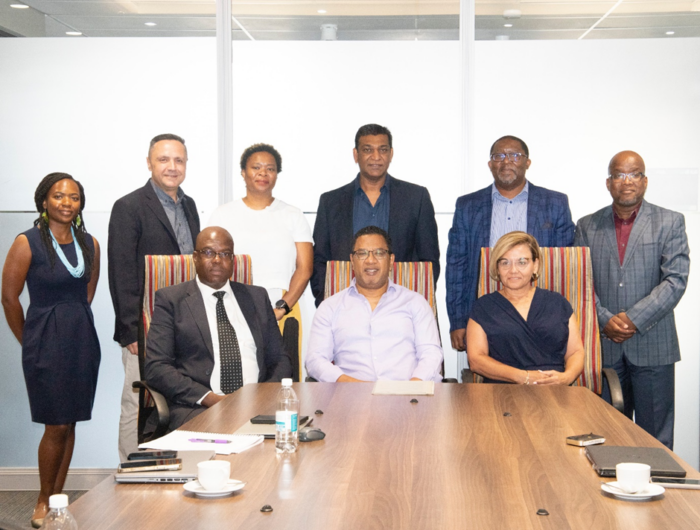
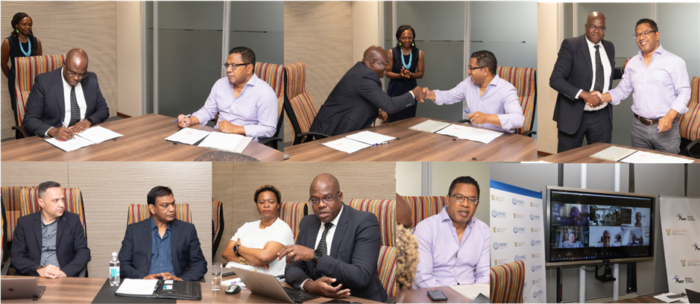
The Human Sciences Research Council’s, Strategic Partnerships Unit facilitated the signing of a historic Memorandum of Agreement (MOA) with the National Research Foundation (NRF) on 13 October 2022 to support research and research support activities in the humanities and social sciences. The MOA will result in a number of research initiatives by the two organisations.
“The MOA provides an overarching framework within which specific activities will be conceptualised, agreed upon and implemented by respective business divisions of the HSRC and the NRF. Further, it improves the efficiencies in implementing the relationship between the NRF and the HSRC,” said Dr Eugene Lottering, NRF’s Deputy CEO.
In the recent past, the HSRC and NRF have collaborated in the implementation of the Science Granting Councils Initiative in Sub-Saharan Africa. In this collaboration, the HSRC leads the initiative’s technical interventions to support the integration of gender and inclusivity in research and research support activities of the participating Sub-Saharan Africa Science Granting Councils (SGCs).
Of significance, the HSRC led a seminal study to contribute to a greater understanding of intersectionality as a framework that supports inclusive gender transformation, with a focus on the strategic role of SGCs in advancing equality. Adopting a mixed-methods design, the project aimed to establish the extent and the way in which an intersectional framework is integrated throughout the grant-making, human capital development and research cycles. It produced critical recommendations for action by science granting councils.
The signing of this MOA will allow for continued engagement between the NRF and HSRC to support the SGCs in implementing recommendations advanced by the study.
Two additional projects will be implemented in the immediate term. Firstly, the HSRC, through Prof Sharlene Swartz, will provide academic leadership to the NRF in the execution of a new global research programme on young people and relational well-being in 12 countries in the Global South, namely: Colombia, Ecuador, Egypt, Ghana, India, Indonesia, Morocco, Romania, Senegal, Tanzania, South Africa, and Vietnam.
Secondly, the NRF and HSRC will collaborate on a project on engaged research that seeks to explore ways in which an engaged research agenda can be established, and on how these research principles and methods can be strengthened, sustained, and leveraged for impact across the NSI.
“This MOA provides an opportunity for the NRF and HSRC to seamlessly collaborate in the immediate and long term in implementing projects that contribute to building the research enterprise in South Africa, on the continent and beyond”, said Prof Khangelani Zuma, Acting CEO: HSRC.
HSRC met with the European Commission’s Joint Research Centre (JRC)
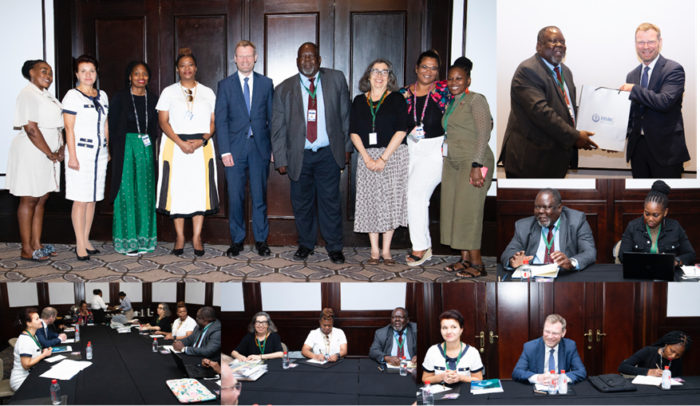
The Strategic Partnerships Unit in consultation with the Department of Science and Innovation’s (DSI), Strategic Partnerships Department, facilitated setting up a meeting with the European Commission’s Joint Research Centre (JRC) as part of country to country Bilateral agreement on Wednesday, 7 December 2022. The JRC, is the Commission’s science and knowledge service. It employs scientists to carry out research in order to provide independent scientific advice and support to EU policy. The meeting was led by the Deputy CEO, Prof Leickness Simbayi, and the JRC’s Director-General, Mr Stephen Quest. Prof Simbayi was accompanied by the divisional executive of the HSRC’s Centre for Science, Technology and Innovation Indicators (CeSTII), Dr Glenda Kruss, and SPU director, Dr Palesa Sekhejane. The meeting explored issues such as evidence-informed policy making; science, technology and innovation roadmaps for the SDGs; demography and migration; biodiversity, climate change & food security; public health and innovation; exploring connection between policy and impact; and science communication.
DigitALL gender equality:
HSRC commemorates International Women’s Day 2023
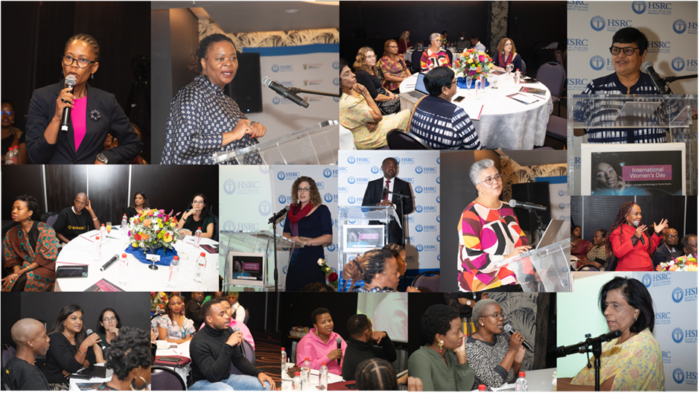
The HSRC’s SPU team together with Communications and partners commemorated International Women’s Day at the Sky Hotel, Sandton, Johannesburg, on 8 March 2023.
The breakfast dialogue sought to reflect on, discuss and highlight the performance of girls in mathematics and science, and to look at the roles and experiences of women and girls in the digital era.
Similar to the United Nations (UN) and UN Women, the HSRC observed International Women’s Day 2023 with a focus on the theme “DigitALL: Innovation and Technology for Gender Equality.” It centred on the significance of improving technology and innovation education, empowering women and girls, reducing the gender digital divide, and addressing pandemic-driven digital disruptions.
At the dialogue, Dr Vijay Reddy shared findings from the Trends in International Mathematics and Science Study (TIMSS), which measures the mathematics and science knowledge of fourth- to ninth-grade learners in various countries around the world.
In addition to monitoring mathematics and science over time, TIMSS also collects contextual information about the home, school and classroom environments to explain learner achievement. The study thus provides an important compass for policy interventions.
The event was organised by the HSRC in partnership with the Academy of Sciences of South Africa (ASSAf), British Council, L’Oréal, the U.S. Embassy, Nka’Thuto EduPropeller, Kenya High Commission, Women in Science, and supported by South Africa’s Department of Science and Innovation (DSI).
HSRC signs MoU with PASGR
The Human Sciences Research Council (HSRC) signed a Memorandum of Understanding (MoU) with the Partnership for African Social and Governance Research (PASGR). The MoU formalized collaboration between the two organizations in areas of research and capacity strengthening. The ceremony took place in at Premier Hotel & Resorts International in Pretoria, South Africa.
“This MoU mirrors PASGR’s strategic expansion as a Pan-African organization thereby collaborating with HSRC is a gateway to accessing the Southern African region of the continent,” said Dr Mveyange Executive Director, PASGR during his opening remarks.
Making sure that our work in building and advancing research PASGR aims to strengthen evidence -informed policymaking and capacity sharing for public policy and governance in Africa. This partnership will ensure that our impactful work in building and advancing research and training capacity and public policy and governance in Africa is reaching to many other institutions in the continent.
Speaking during the ceremony Dr. Sekhejane, the Director of Strategic Partnerships at HSRC, mentioned that the MoU is a demonstration of commitment among the two organisations to drive impact in South Africa and the region and looks forward to furthering not only research and capacity development but also ensuring that both organizations can come together and work in a Pan-African spirit. She added that “this will ensure that we collectively reach out and work with policymakers, practitioners, academia, civil societies and private sector”
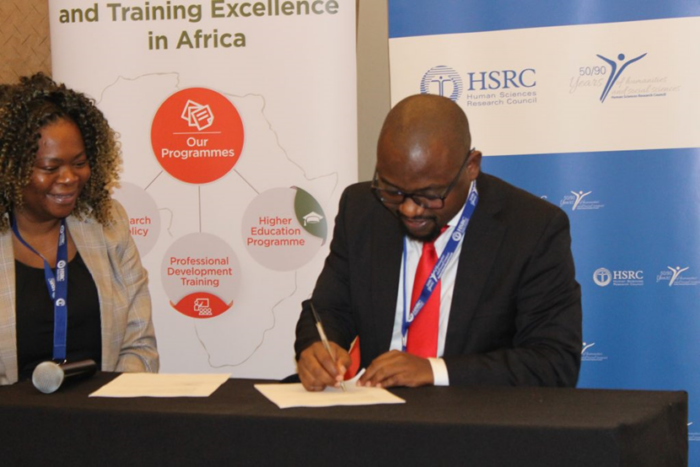
Dr. Palesa Sekhejane Director of Strategic Partnerships at HSRC and Dr Anthony Mveyange PASGR’s Executive Director, signing the MoU.
At the core of its mission, PASGR strives to advance research excellence for governance and public policy in Africa; working in partnership with individual academics and researchers, higher education institutions, research think tanks, civil society organizations, private sector, business and regional policy communities across Africa. HSRC’s core business is to conduct large-scale, policy-relevant, social-scientific projects for public-sector users, non-governmental organizations, and international development agencies, forming partnerships with researchers globally, but specifically in Africa.
The MoU will also allow the partner institutions to develop and implement joint research projects in areas of common interest, and mobilize resources and support joint efforts towards implementation of agreed projects activities. “This partnership with PASGR bares a lot of potential to be transformative and be inclusive as far as the developmental trajectory of Africa and its policies are concerned,” concluded Dr. Sekhejane.
Speaking during the ceremony, The Acting HSRC CEO, Prof. Leickness Simbayi mentioned that he welcomes the opportunity to work together with PASGR as he sees a lot of complimentary synergy between the two organisations especially in building capacity and deriving policy impact on the continent.
“Together we can and will build the Africa we want,” said Dr. Mveyange in his closing remarks. He also remarked that in an effort to build effective partnerships for enhanced capacity and strategic cooperation around mutual interest, PASGR shall continue to work together with strategic partners like HSRC to realize its vision and mission.
Science must serve all of society
World Science Forum 2022 | SIDE EVENT

The 2022 edition of the World Science Forum (WSF), held in Cape Town at the beginning of December – the first on African soil – offered the opportunity for participants to deliberate honestly about these questions and provide lasting solutions. The WSF is a global biennial meeting that provides the scientific community, public policy makers, industry, civil society and other stakeholders with a global platform to exchange ideas on the growing interdependence of science and society, and the role of science in addressing global challenges facing humanity.
Set against the backdrop of the most unequal country, and on the poorest continent, in the world, the theme for WSF 2022 was “Science for Social Justice” and sought to tackle sub-themes such as “Science for Human Dignity”, “Science for Africa and the World and “Justice in Science”. The broad themes of the forum suggested that discussions were not just to be limited to the issues of natural sciences, but also elevated the oft-forgotten role of social sciences.
The SPU had the privileged of putting together a panel in one of the pre-events, in collaboration with the South African Council for Natural Scientific Professions, the Swedish Embassy and the University of Pretoria under the theme, “Science for Inclusivity, Innovation, Food Security, Nutrition and Social Justice”
The session identified existing and emerging intervention models that are embedded in system designs towards an integrated application of science and practice innovations and policy for enhanced socio-economic conditions. One of the objectives delivered on was identifying policy support gaps within the Africa Region and the impact of international cooperation frameworks i.e. funded programs/projects. Secondly, awareness was created around the links to agricultural innovations and investments and the important role these play in changing outcomes, behaviour, culture and possibly communication.
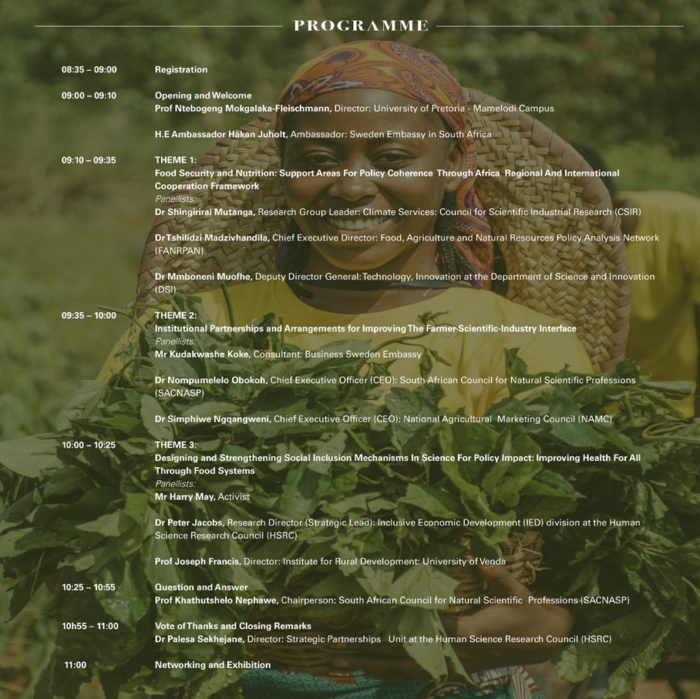
Listen to Dr Peter Jacobs from the HSRC on Science for Inclusivity, Innovation, Food Security, Nutrition and Social Justice, on the Voice of the Cape.
